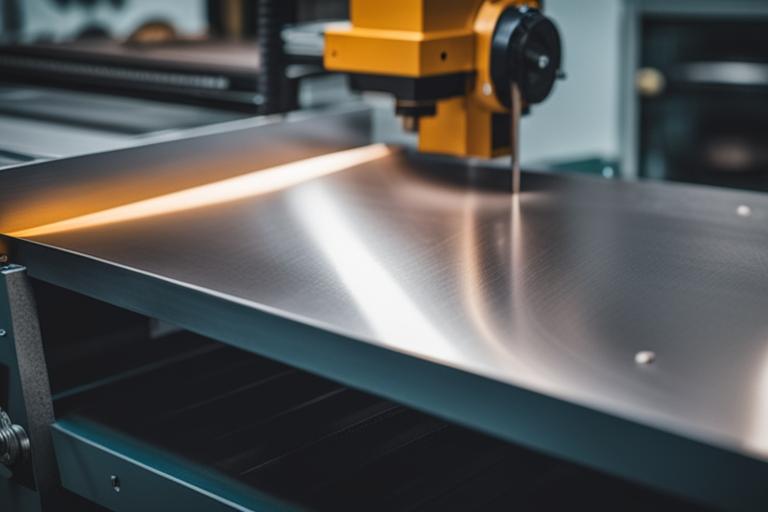What you will learn about metal fabricators
By reading this article, you will learn:
– The definition, importance, and evolution of metal fabrication
– The equipment, materials, design, fabrication processes, and quality control in precision sheet metal fabrication
– Industry applications, customization, environmental considerations, case studies, future trends, and how to choose the right metal fabricator
Are you a metal fabricator looking to enhance your knowledge and skills in precision sheet metal fabrication? Metal fabrication is the process of shaping, cutting, and transforming metal into final products used in various industries. Precision sheet metal fabrication is a specialized form of metal fabrication that focuses on creating intricate and high-precision metal components and structures.
In this guide, we will delve into the definition, importance, evolution, and applications of precision sheet metal fabrication, providing insights into the equipment, tools, and materials used in this process.
Definition of Metal Fabrication
Metal fabrication involves processes such as cutting, bending, and assembling raw materials to create metal structures, utilizing skilled craftsmanship and advanced machinery to produce high-quality products.
Importance of Metal Fabricators in Various Industries
Metal fabricators play a vital role in industries like aerospace, automotive, electronics, and medical equipment by providing essential components and structures, contributing to the efficient functioning of these sectors.
Evolution of Metal Fabrication
Metal fabrication has evolved from traditional methods to precision sheet metal fabrication, emphasizing accuracy, efficiency, and customization through technological advancements.

Understanding Precision Sheet Metal Fabrication
Precision sheet metal fabrication involves the manufacturing of detailed metal parts and products using cutting-edge technologies and processes, catering to industries with stringent requirements for precise and complex metal components.
Key Roles and Responsibilities of Metal Fabricators
In precision sheet metal fabrication, metal fabricators interpret engineering drawings, select appropriate materials, and utilize specialized equipment to produce accurate components.
Applications in Different Industries
Precision sheet metal fabrication finds applications in aerospace, where complex and lightweight components are required, and in electronics, where intricate metal enclosures and casings are essential.

Equipment and Tools in Precision Sheet Metal Fabrication
Precision sheet metal fabrication relies heavily on advanced equipment and tools that enable metal fabricators to achieve precise and intricate results.
Laser Cutting Machines
Laser cutting machines allow for high-precision cutting of intricate shapes and patterns on various types of metals.
CNC Punching Machines
Computer Numerical Control (CNC) punching machines create precise perforations and shapes in metal sheets, enhancing the versatility of fabrication processes.
Press Brakes
Press brakes are essential for precision bending and forming of metal sheets, enabling fabricators to produce components with accurate angles and dimensions.
Other Specialized Equipment for Metal Fabricators
Metal fabricators also utilize specialized machinery such as water jet cutters, turret punch presses, and automated robotic systems to streamline fabrication processes and enhance precision.
| Types of Metals and Alloys | Properties | Applications |
|---|---|---|
| Stainless Steel | Corrosion resistance, durability | Aerospace, automotive, medical equipment |
| Aluminum | Lightweight, conductivity | Electronics, automotive, aerospace |
| Copper | Electrical and thermal conductivity | Electrical components, heat exchangers |
| Titanium | High strength, corrosion resistance | Aerospace, marine industry |
| Brass | Malleability, acoustic properties | Musical instruments, plumbing fittings |

Materials Used in Precision Sheet Metal Fabrication
The choice of materials is critical in precision sheet metal fabrication, as different metals and alloys exhibit varying properties and characteristics that influence the fabrication process and the final product’s performance.
Types of Metals and Alloys
Metal fabricators work with a wide range of materials, including stainless steel, aluminum, copper, and alloys such as titanium and brass, each with unique properties and applications.

Properties of Stainless Steel, Aluminum, and Copper
Stainless steel is valued for its corrosion resistance and durability, aluminum for its lightweight and conductivity, and copper for its excellent electrical and thermal conductivity.
To enhance the expertise presented in this article, real-life examples or case studies of precision sheet metal fabrication projects and insights or tips from experienced metal fabricators can be incorporated, providing practical examples and first-hand experience in precision sheet metal fabrication.
Q & A
Who are precision sheet metal fabricators?
Precision sheet metal fabricators are professionals who specialize in cutting, shaping, and assembling metal sheets with high accuracy.
What services do metal fabricators offer?
Metal fabricators offer services such as laser cutting, welding, bending, and finishing to create precise sheet metal components and products.
How do precision fabricators ensure accuracy?
Fabricators use advanced machinery, computer-aided design (CAD), and quality control processes to ensure precise measurements and high-quality results.
What if I need a custom metal part?
Precision sheet metal fabricators are equipped to handle custom orders, working closely with clients to meet specific design and production requirements.
How can I find a reliable metal fabricator?
Look for fabricators with a proven track record, certifications, and positive client testimonials to ensure quality and reliability.
What if I have a tight deadline for my project?
Many metal fabricators offer expedited services and can accommodate tight deadlines, but it’s important to communicate your timeline upfront to ensure feasibility.
